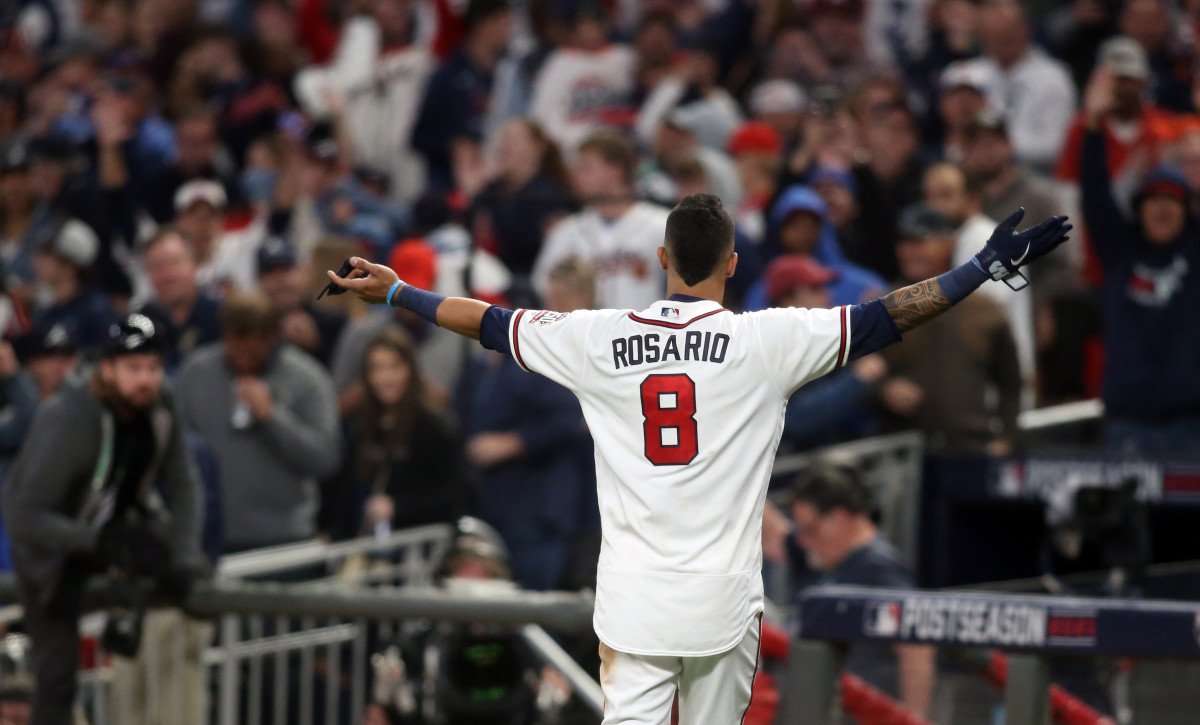The Braves Beat the Dodgers in Game 2 of the NLCS by the Narrowest of Margins

ATLANTA — The Braves barely won Game 2 of the National League Championship Series on Sunday. They scarcely, narrowly, just won it. They won it by an inch or two past a shortstop’s glove, a degree or two off the angle of a throw, a finger or two ahead of a tag, a mile an hour or two of wind, a lace or two on that same shortstop’s glove. They won it by a Dodgers loss in April or May or June or July or August or September, by an ownership group looking to shed money, by a strained abdominal muscle. They won it 5–4, in the final at bat of the night, by the thudding heartbeat of the 41,873 in attendance to witness the team’s second straight walk-off win.
Any of those infinitesimal margins could have changed the outcome. Los Angeles won 18 more regular-season games than Atlanta; if the Dodgers had won a single additional regular-season game, they would have won their division, they would be hosting this series and it would be they who got to bat last.
Instead the eighth inning arrived and here was left fielder Eddie Rosario. He is only a Brave because the Twins, who drafted him in 2010 from high school in Guyama, P.R., did not want to pay him the $10 million or so he would make in arbitration in 2021. They did not tender him a contract, so he signed with Cleveland, where he hurt himself running out a grounder in July. When Atlanta general manager Alex Anthopoulos needed to remake his outfield at the trade deadline, he nabbed Rosario at a discount because the player would not be available until late August.

Rosario strode to the plate with his team down 4–2. He pulls the ball 40% of the time, so the Dodgers stacked three infielders between first and second. He slapped a curveball the other way, just past the glove of the fourth one, shortstop Corey Seager.
The next batter, first baseman Freddie Freeman, lofted an easy fly ball to left. Rosario raced toward second. He made it only because left fielder AJ Pollock’s throw was a few feet off line.
Then, on second baseman Ozzie Albies’s single to short right field, Rosario froze briefly to make sure the ball fell in. Still, third base coach Ron Washington sent him home. Rosario, who was shocked to see that the ball had already made it to the infield, flung his body one direction and his left hand the other to avoid catcher Will Smith’s tag. The Dodgers challenged the call, but replay upheld it.
“I was scared a little bit,” Rosario said afterward. “But I did a good job on the slide. I did a really good job.”
Atlanta tied the game a batter later on third baseman Austin Riley’s double but could not add to the score. So when Dodgers second baseman Trea Turner opened the top of the ninth by taking perhaps his best swing of the month, most everyone in navy blue began to mourn. The ball would have been a home run in 29 ballparks. It would have been a home run at Truist Park with slightly different weather. It was not a home run. With his shoulders nearly touching the left field wall, Rosario snatched the ball out of the air.
“It stayed in the field,” he said. “It stayed in the field.”
Sign up to get the Five-Tool Newsletter in your inbox every day during the MLB playoffs.
Atlanta escaped the next two batters to give itself a chance to walk off. With two outs and shortstop Dansby Swanson on second, the Dodgers brought in closer Kenley Jansen to face Rosario. In Game 1, that matchup had produced a grounder to third. Rosario did not want to do that again.
“I feel great today, and when I feel great I go aggressive,” he said. “But I don't want to try too much today. Yesterday I tried to hit a homer and today I'm going to try to hit a base hit.”
He lined the first pitch he saw at Seager. Inwardly Rosario mourned. Then the ball glanced off the shortstop’s glove. Swanson crossed the plate and kept going, to first base, where the rest of the Braves were mobbing Rosario.
“That's what it takes to win these games,” said Atlanta manager Brian Snitker. “If they got an out left or a strike left, as we have seen, they might make something happen. So these guys just keep playing the game. They play a hard 27.”
An inch or two, a degree or two, a finger or two, a mile an hour or two, a lace or two. The Braves barely won Game 2. Another way to say that, though, is: They won.
More MLB Coverage:
• How Should We Feel About the Astros?
• In Moving an Inch, Kiké Hernández Stands Among Giants
• Chris Taylor's Ninth-Inning Blunder Bungles Dodgers’ Chance in NLCS Game 1
• The Art, Craftsmanship and Changeup Behind Correa's Masterpiece
